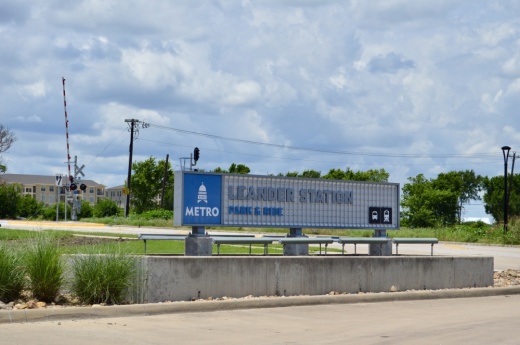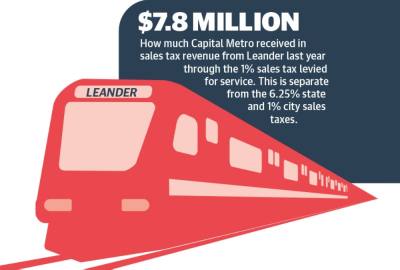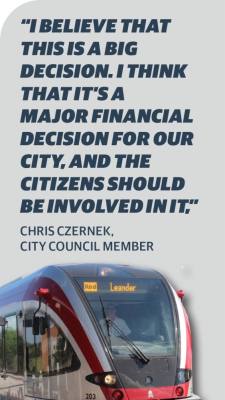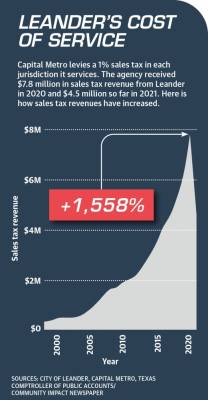Leander voters, once again, may have the choice whether to stay in or leave Capital Metro services. But residents, city leaders and council members all have questions about what the exit means financially and for the city’s future.
Mara Daly relies on Capital Metro rail service to commute to and from work in downtown Austin. Daly, a Leander resident since 2012, said her family moved to their current home in Oak Creek because it is across from Leander Station. Her commute is about one hour compared to a three-hour roundtrip commute if she drove.
Without rail service, Daly would pay about $600 per month for a downtown parking space, she said, or her family would consider moving out of Leander near a MetroRail station.
Daly said she was taken aback that the city was considering leaving given the city’s rapid growth and nearby under-construction Northline mixed-use development. She wants to know what other options Leander has, such as making the MetroRail more desirable by adding train time slots.
“Taking into account that Northline is coming and the whole idea of Northline was that it was commuter-friendly,” Daly said. “If that was the goal, then you’re taking away a part of what draws people to live there.”
Council discussions
In May, Leander City Council voted 6-1 to direct staff to begin the process of placing Capital Metro on the ballot. Leander Mayor Christine Sederquist voted against the motion. The item was privately discussed in an executive session.
Sederquist, who was still a council member during the vote, said she had not spoken with Capital Metro yet and asked council members to wait until she spoke with the transportation authority as mayor. She said she was set up “for an adversarial relationship going in.”
Council publicly discussed Capital Metro on June 3 when council members and staff discussed the need for more data so informed decisions can be made. City spokesperson Mike Neu said city officials want data on how many riders start or end at Leander Station.
To put the decision on a ballot, the council would need to approve an ordinance to call an election, according to the city. If council chooses, the deadline to call a November election is Aug. 16.
Before an election is brought to Leander voters, Sederquist said she wants to learn how often residents use Capital Metro services, what the cost would be to exit the partnership and what services the city would be responsible for providing.
In a statement, Capital Metro spokesperson Jenna Maxfield said Capital Metro is working with Sederquist and council members on their partnership.
“Capital Metro is committed to continuing to serve the residents of Leander who rely on and enjoy the benefits of our services,” Maxfield said. “We were not notified of this potential action prior to the Leander City Council meeting, as it was not posted in a manner to give public notice or receive public input from the Leander community on this specific action.”
Council members have said they do not want to leave Capital Metro without an alternative to it in place. If Leander were to leave Capital Metro, it would need to provide a paratransit replacement, Sederquist said. This is for “people with disabilities who cannot use the fixed-route bus or rail service because of a disability,” according to the Americans with Disabilities Act.
Sederquist said Capital Metro estimated it would cost $39 million to exit the partnership, but that number might not be accurate as the cost is a “moving target,” Sederquist said.
“That’s their number, and they haven’t brought anything to back up why that’s their number,” she said. “They also say that we are receiving more in services than they are being paid in.”
The number would be based on the “outstanding financial obligations of the withdrawing city as of the date the election is canvassed,” according to the transportation authority.
Council Member Chris Czernek said he wishes these serious Capital Metro discussions happened earlier. He said there should be basic data and information presented, such as detailed ridership data and service costs, to allow residents to decide.
“I believe that this is a big decision. I think that it’s a major financial decision for our city, and the citizens should be involved in it,” he said. “It’s my job as a council member to bring it before them.”
Czernek said supporters of the transit system, himself included, say the amount paid is unsustainable. City staff is researching public transportation alternatives and costs, he said.
“Either we’re in, or we’re out,” he said. “That’s why this is not an emotional decision. Either the city wants to be in or they want to be out. They think this is the best use of the sales tax dollars that are coming into the city, or they think it’s not.”
Capital Metro’s Leander history
The public transportation provider offers weekday commuter bus routes and Monday through Saturday MetroRail service in Leander.
In July 2019, council held similar discussions in which it considered “possible withdrawal” from Capital Metro. Those discussions and a council workshop resulted in the transit authority adding on-demand services called Pickup to Leander.
Leander is one of the remaining original members of the Central Texas transit authority, which formed in 1985 with Austin, Leander, Cedar Park, Pflugerville, Manor, Lago Vista, Jonestown, Point Venture, Volente, San Leanna, West Lake Hills and Rollingwood as members. West Lake Hills, Rollingwood, Pflugerville and Volente are no longer members. Cedar Park also left in 1998, and voters chose to devote sales tax funds previously paid to the Capital Metro to economic and community development.
If Leander leaves Capital Metro, it could also recapture the $0.01 sales tax and use it for economic development, staffing or other budget needs that benefit residents, Sederquist said.
Leander’s $0.01 city sales tax brought $7.8 million in revenue in 2020, according to the state comptroller. That number is expected to continue increasing—possibly reaching $9 million in 2021. So the 1% sales tax given to Capital Metro will parallelly increase over time.
“Having that 1 cent is something that we can add to the budget. What I told Cap Metro is $9 million is a drop in the bucket in your budget, but it’s big on ours,” she said.
Leander resident Gary Woerner said he would vote against staying in Capital Metro if an election is called. Woerner said he would rather see the money invested in water infrastructure.
As remote work becomes the norm, Woerner said he expects fewer people to commute to work. Additionally, there are no rail stops at the developing Apple campus in Northwest Austin.
“If everything was in downtown Austin and this area was trying to grow a lot because that’s where all the jobs are at, I could understand it,” Woerner said. “But that’s not the situation because everything is remote.”










